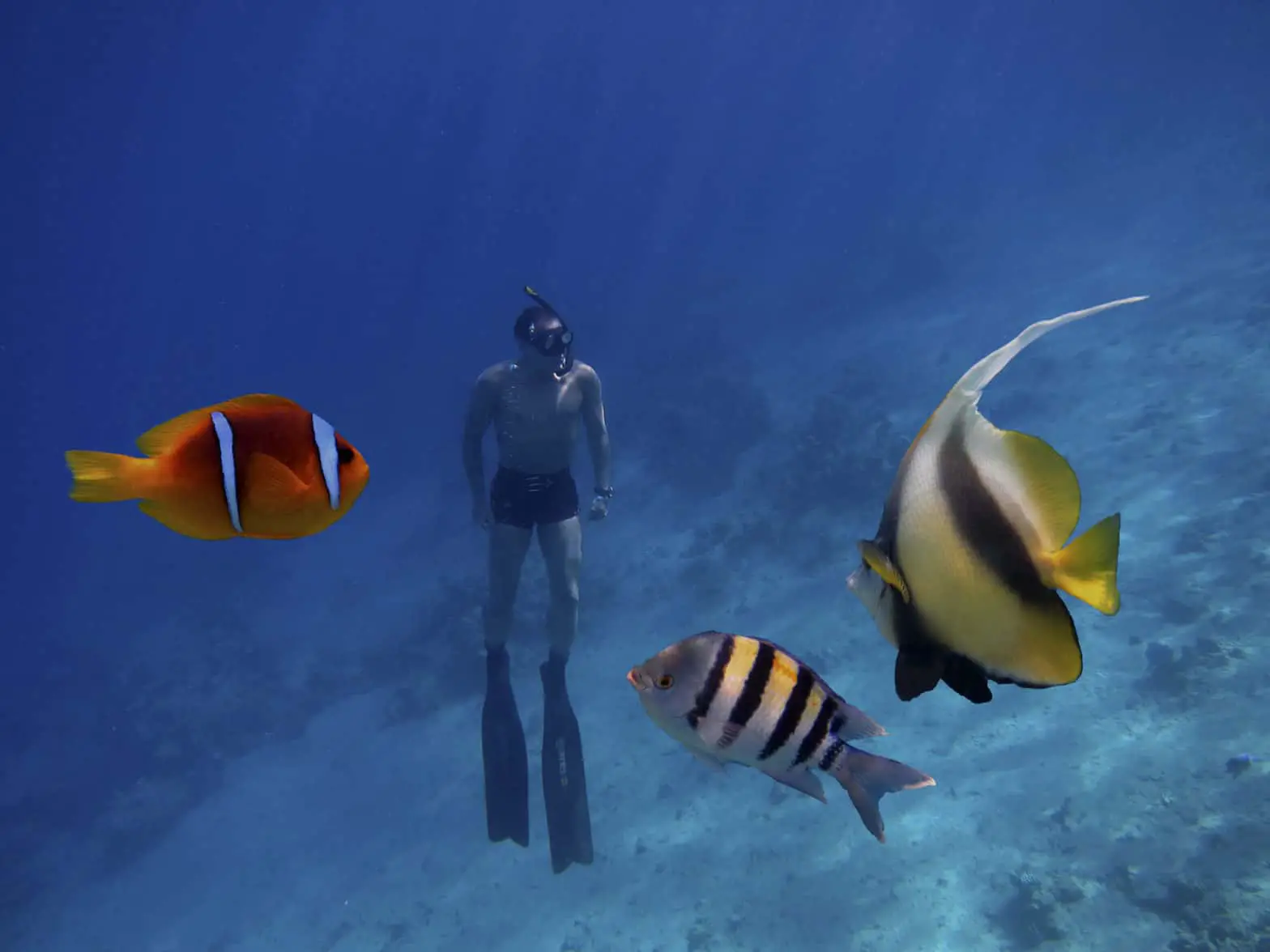Table of Contents
Being an avid swimmer and diver, you know how to hold your breath. There is a part of you that would like to be able to do better and go longer without having to surface for a breath. You’ve been scuba diving for a little while, but freediving is starting to catch your eye. You always enjoy the freedom and independence snorkeling affords. You can’t imagine what that would be like on a much larger and deeper scale.
You realize to be able to free dive, you will have to get a lot better at holding your breath for a lot longer time. Some free divers can go minutes, some upwards of five minutes, before having to take a breath. Imagine being able to stay submerged for minutes, taking in the sites of the ocean around you, not having to surface before catching a glimpse of an elusive puffer fish you believe is lurking just a little deeper.
[amazon bestseller=”diving helmet” items=”3″]
Learning how to hold your breath longer is a skill that can be achieved through patience, diligence and exercise. How is it possible for a human to maintain a single breath for minutes without passing out? What kind of practice, aside from the obvious, can you expect to do to be able to hold your breath longer? In order to learn the safe and proper way to keep a single breath for a more extended period, it is first necessary to go over some of the science behind it.
How Can a Human Hold a Breath for So Long Without Causing Damage?
Since you were young, you’ve heard about all the harmful effects not being able to breathe has on the body. Aside from the obvious – death – there are some injuries the body suffers when oxygen has been cut off for too long. You often hear about these things concerning accidents, such as drownings, suffocation and traumatic events. What exactly happens when the body is cut off from oxygen for too long?
Generalized Hypoxia
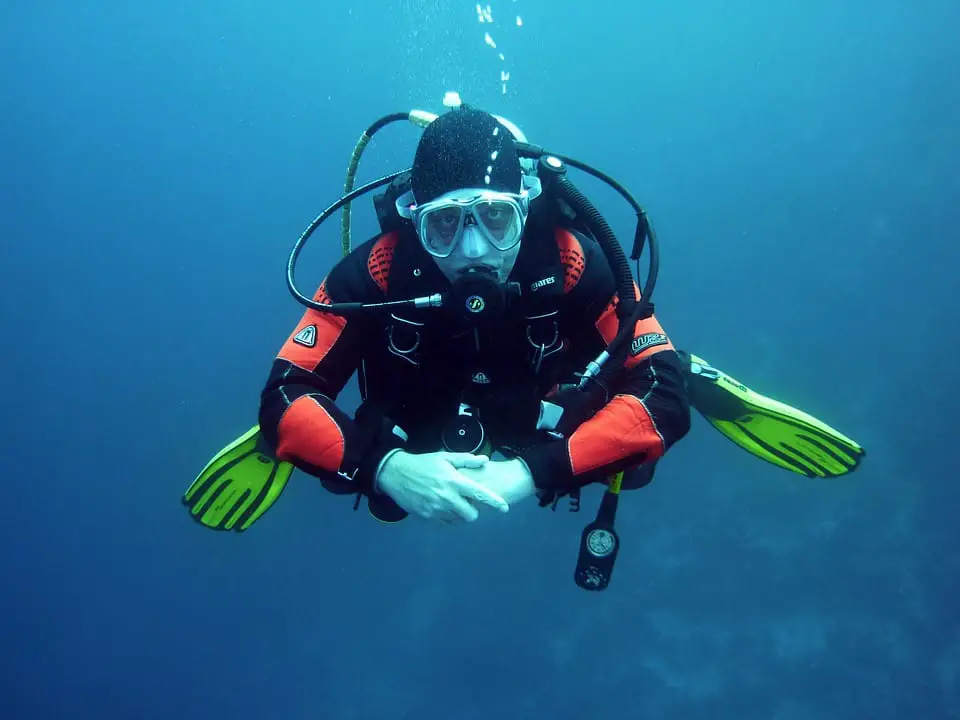
Ironically, you may have heard the term hypoxic gases when you first learned how to scuba dive. Hypoxia is the effect of oxygen deprivation on the brain. It usually occurs in high altitudes where the ratio of oxygen is limited. In scuba diving, it may happen when the ratio of oxygen delivery isn’t up to par. This can occur when you suffer a malfunction with your rebreather. The effects of hypoxia are quick-acting and hard to recognize unless you are trained to do so.
Some of the general symptoms are:
- Lightheadedness
- Fatigue
- Tingling in the hands and feet
- Nausea
All of these things occur because the brain puts the body in essential survival mode. Once it detects oxygen has ceased flowing with regularity, and in healthy levels, it starts to shut down blood flow to non-essential organs. This shut down first occurs to the extremities, hence, the reason for the tingling and numbness in the hands and feet.
The next thing that starts to occur is typically an onset of fatigue. This happens because the heart rate is slowed, natural breathing isn’t happening, and the brain is fighting to divert every bit of oxygen in the blood to keep it and the heart pumping. Even people who survive oxygen deprivation may lose consciousness at some point. If you pass out while in a precarious situation, such as being underwater, this could have deadly consequences.
Hallucinations and lightheadedness occur when the brain is, essentially, struggling to stay alive and it too starts to reduce its function. You, therefore, can’t think straight. Things that made sense don’t, and you may begin to have visions. Sometimes, as in the case of high-altitudes, you may start to feel capable of doing things you would typically know you can’t do. In the water, this might manifest as the belief that you can breathe underwater. If you aren’t trained in the signs and symptoms of hypoxia, holding your breath may have deadly consequences.
How Can You Train Yourself to Hold Your Breath Longer?
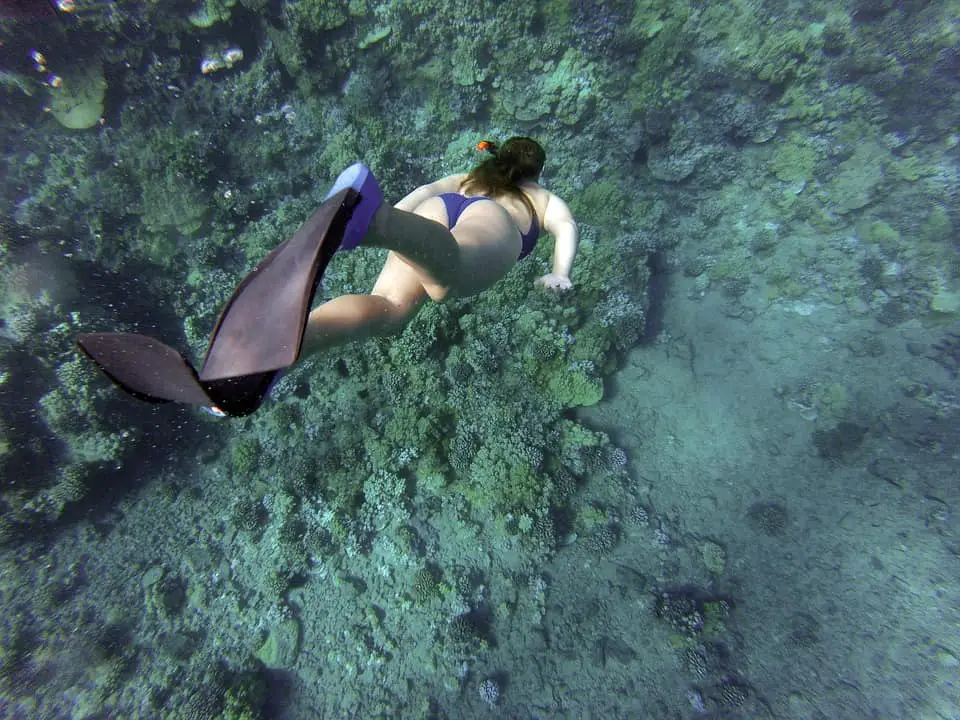
If you are serious about wanting to free dive, one of the first things you should do is go to some training classes. Even if you are an experienced scuba diver, it is essential to learn some of the skills necessary to ensure a safe and successful freediving experience. Scuba and freediving are not the same things. You would not expect a free diver to know how to scuba dive automatically. The opposite is also true.
Always remember, never dive without a trained partner; don’t hyperventilate (not good at any time, let alone underwater); and, Make slow and steady progress. Freediving takes time, and there is no reason to push yourself too fast too soon. Doing so can result in catastrophic and permanent damage.
In your basic class, your instructor will give you some tips and tricks to try in order to build up your ability to hold your breath for more extended periods of time.
Other than these basic principles, there are other techniques to practice.
How Long Can You Hold Your Breath on Dry Land?

One of the first things you should do is assess how long you can initially hold your breath. These findings will help you develop a good baseline, and it may also help predict how long it will take you to reach your ultimate goal.
To take your first measurement:
- Sit or lie down in a relaxing position and breathe normally.
- Take a large breath, hold it for a beat and then force it all out.
- Take an even bigger breath, hold and start the clock. Think of calming things such as your favorite dive site, a beautiful painting.
- When you can’t hold your breath anymore, exhale and concentrate on regulating your inhales. Take full breaths to recover, but do not hold them.
If you were able to hold your breath for a minute, you might be able to train yourself to hold it for three minutes in a month’s time. If you could already hold your breath for two minutes, you can expect to be able to hold it for five minutes or higher within a month.
Develop Your Technique

One of the hardest things to learn is how to hold your breath effectively.
Relaxation: In preparing for your session, concentrate on relaxation techniques. Practicing yoga and meditation are essential in successfully holding your breath longer. All of your muscles must be completely relaxed and disengaged. They will use oxygen if they are active in any way. Your mind must also be relaxed. Find something to focus on that calms you.
Breathing: Breathing must be regular and then move at a slower pace. The more relaxed you get, the more comfortable your breathing is. Concentrate on your breath. Many meditation sessions will have you focus on your breath. Do that now.
Final Breaths: It is important to work up to the lengthier breath holds. This should be a three-breath process. The first breath should be held at 75% lung capacity. The second breath should be the same but include a 100% expulsion of the air. The third breath is your hold breath and will be at maximum lung capacity.
Keep your mind free of stress. It is a good idea to find something soothing you can concentrate on. The most effective way to learn how to hold your breath longer is to practice how to relax mentally and physically.
Interval Exercise
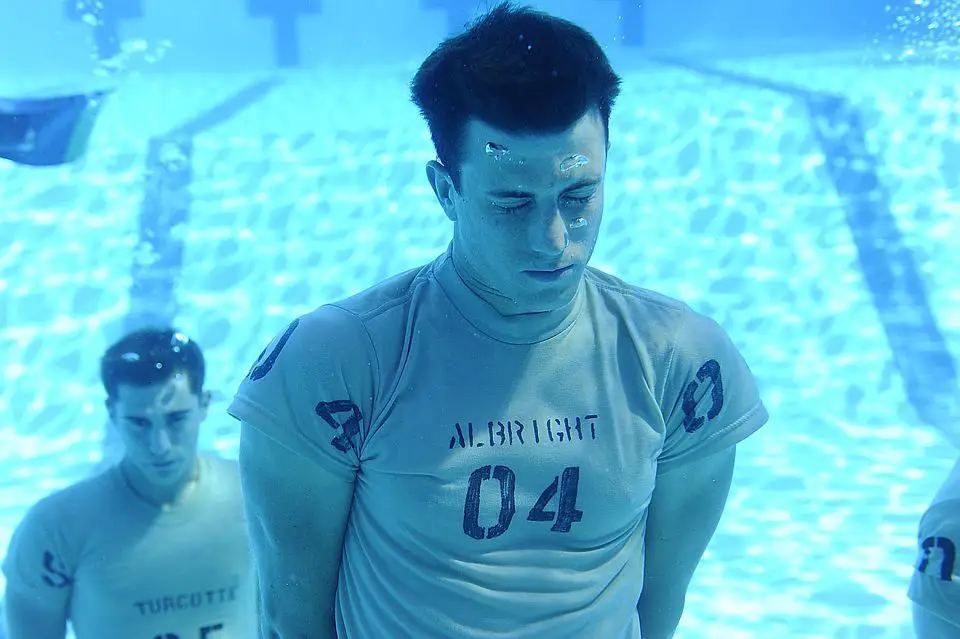
After you’ve got your breathing rhythm and your relaxation practice down pat, it’s a good idea to start trying to train your body how to handle oxygen deprivation. One of the critical elements is teaching your muscles what to do. When muscles are deprived of oxygen, they start to burn glycogen and phosphates, thus preserving any oxygen already in the body. Pushing yourself through interval training with short bursts of high energy cardio can help train your muscles to repeat this process. Some people prefer to do these short bursts while holding their breath. While not required, you can understand the motivation behind it.
Practice Makes Perfect
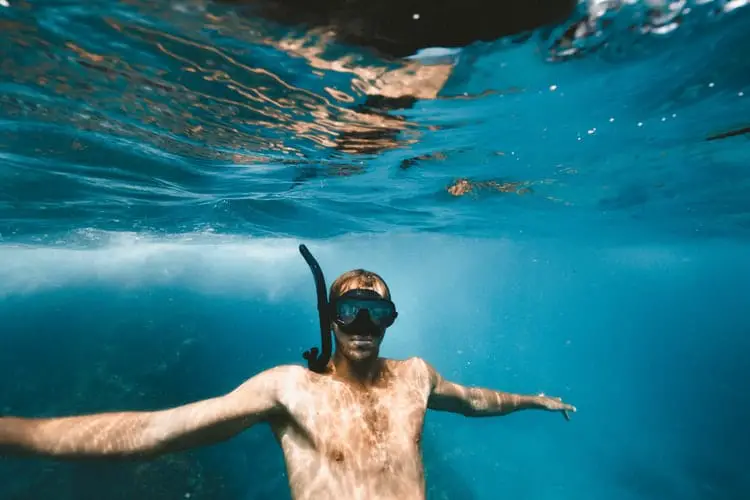
It’s a good idea to get on a training schedule. You don’t want to cause harm by doing too much too quickly. Remember, slow and steady is the way to go when it comes to all things dive-related. Put yourself on a manageable schedule of breath holding, relaxation techniques and exercise. Notice all these things are done on land. While it may be mentally harder to hold your breath longer on land because you know you can breathe at any time, it is much safer. Don’t push yourself to dive into the pool to try your techniques until you have mastered the relaxation portion.
One super important thing to remember is after you’ve been holding your breath, don’t attempt to exhale unless you can immediately inhale. Meaning, don’t practice slowly exhaling underwater because your body’s immediate reaction is going to be to inhale. On land, this is one thing, but underwater, it will have dire consequences. Learning how to hold your breath longer, like many things, hinges on technique, practice and diligence.
It’s a good idea to get on a training schedule. You don’t want to cause harm by doing too much too quickly. Remember, slow and steady is the way to go when it comes to all things dive-related. Put yourself on a manageable schedule of breath holding, relaxation techniques and exercise. Notice all these things are done on land. While it may be mentally harder to hold your breath longer on land because you know you can breathe at any time, it is much safer. Don’t push yourself to dive into the pool to try your techniques until you have mastered the relaxation portion.
One super important thing to remember is after you’ve been holding your breath, don’t attempt to exhale unless you can immediately inhale. Meaning, don’t practice slowly exhaling underwater because your body’s immediate reaction is going to be to inhale. On land, this is one thing, but underwater, it will have dire consequences. Learning how to hold your breath longer, like many things, hinges on technique, practice and diligence.

